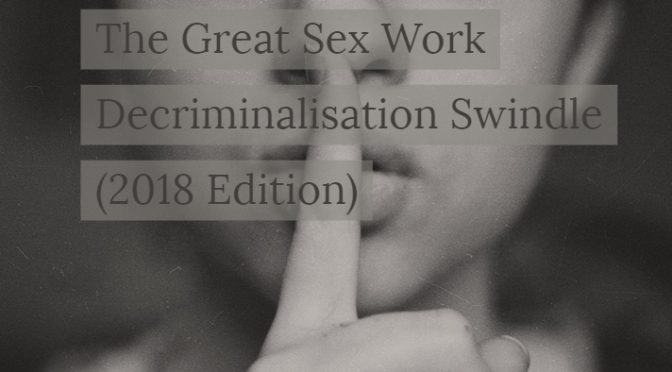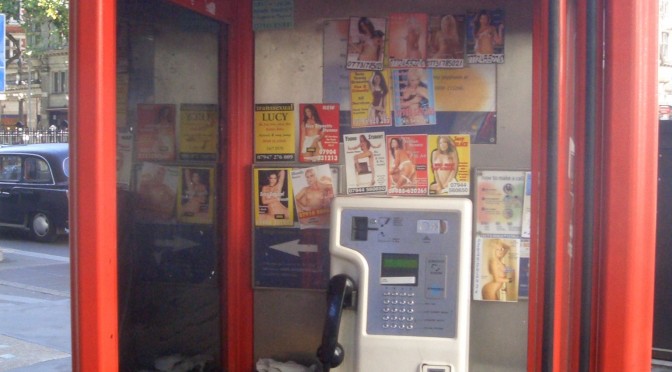The issue of sex work decriminalisation seems straightforward on the surface. But nothing can be understood without understanding the underlying political context, and especially that in these strange times fascism flows under the surface of all political debate. In Britain, sex workers enjoy a relatively liberated status compared to those in many other countries. Both the sale and the purchase of sex are legal activities. The primary obstacle to liberty is the fact that “brothels” are banned; and a brothel constitutes any two or more people working in the same premises. And so, sex workers often work alone (and unprotected), often against their wishes.
These days, faux-liberal language is routinely used to hide conservative attitudes. So two years ago, when a parliamentary committee expressed support for “decriminalising sex workers”, activists celebrated. But as I warned then, the announcement was an empty one. Note the choice of words: not “sex work” but “sex workers”. The announcement left open the option of the “Nordic model”, which criminalises buyers, not sellers. Rather than express solidarity with sex workers, this model applies a feminist lens to the issue, treating prostitutes as victims rather than as free agents. Some of my acquaintances in the sex worker activist community were angry with me pouring cold water on this “victory”. But it was no victory.
Sex worker as victim
The treatment of sex workers as unwilling actors is not just a game played by anti-sex work feminists and the “rescue industry”, but by some sex worker advocates too. Left-wing activist groups see prostitution not as a choice, but as something forced on women by the ethereal “Patriarchy” and “capitalism”. These activists are adamant that nobody could ever really enjoy sex work, and that sex work is a necessary stop-gap until the eventual overthrow of patriarchal-neoliberal-capitalism (insert your own neo-leftist word spaghetti here). Inevitably, sex worker activist groups have become infected with identitarian attitudes, and so announcements tend to be riddled with lip-service being paid to trans people, “women of colour” and other groups deemed to have been forced into sex work by their “systemic oppressions”.
These sex worker activist groups tend to be dominated by privileged, middle-class women, and their attitudes infuriate many sex workers. Privately, sex worker friends confide their dislike of being portrayed as victims, and I sometimes receive messages from sex workers who are outraged that they are not allowed to claim they ever enjoy their work, for fear of being branded traitors or patriarchal shills.
Corbynite conservatives
Given the worldview of the far-left – that all “workers” are victims of capitalism – it is unsurprising that Jeremy Corbyn (a typical conservative of the middle-class left) has announced support for the Nordic model:
“I don’t think people that are, mainly women, working in sex industry should be criminalised from working in it… Those benefitting should be the ones we go after.”
This was all so inevitable. As the working class has turned its back on the left, so the left has become an increasingly privileged clique seeking to impose its twisted vision of “social justice” on those they deem to be victims.
From the Nordic model to the censorship model
The Nordic model represented a subtle shift as feminists took over the morality movement from Christians. Instead of treating prostitutes as criminals, they chose to treat them as victims, and turned their attacks on clients instead. But now, the Nordic model may also be outdated and unnecessary, because censorship is a far more effective way to attack sexual liberty.
The Digital Economy Act (2017) introduced a state Internet censor to the UK, and that changed everything. The authorities no longer need to outlaw anything. They simply need to find an excuse to block content. The Act was ostensibly about pornography, but I’ve warned repeatedly that this was a smokescreen. Porn is simply the first category of content that will be blocked. Having implemented the blocking system, the state can add as many new categories as it chooses. The recent US laws FOSTA and SESTA point the way forward. Moralists no longer need to attack either sex workers or their clients. Instead the state can criminalise (using the excuse of “sex trafficking”) the platforms that they use to communicate. The Labour MP Sarah Champion recently introduced a debate into the House of Commons last week on this subject.
The UK’s two leading sex worker platforms, Adultwork and Viva Street, were singled out to be named and shamed, just as those of us who tried to run UK-legal porn platforms were attacked in 2012. It’s perhaps ironic that individuals at both companies have been broadly supportive of the blocking system, mistakenly believing that they could stay on the right side of the law. They were wrong: the British state, having watched from the sidelines for decades as the Internet took away its censorship powers, is now getting its claws stuck back in.
This isn’t about sex work, any more than it was about pornography or “hate speech”. We are watching the erosion of Internet free speech. Free speech is not just another issue: it is the issue of our age. Unless we resist now, future generations will marvel at the golden era of free expression that we enjoy from about 1990 until… well, around now.
How do you help? Sex work decriminalisation is a worthy goal, but the free speech issue cuts far deeper. You can help the English Collective of Prostitutes respond to the government survey (deadline 16th July), and you might consider supporting my Patreon campaign. The issue of free speech has been recently hijacked by the far-right and my goal is to bring it back into mainstream politics.




